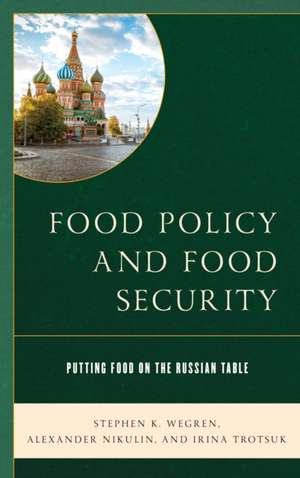FOOD POLICY AND FOOD SECURITY CB: Russian, Eurasian, and Eastern European Politics
Autor Stephen K. Wegren, Alexander Nikulin, Irina Trotsuken Limba Engleză Hardback – iun 2018
Din seria Russian, Eurasian, and Eastern European Politics
- 23%
 Preț: 688.28 lei
Preț: 688.28 lei -
 Preț: 293.80 lei
Preț: 293.80 lei - 23%
 Preț: 664.36 lei
Preț: 664.36 lei - 27%
 Preț: 681.83 lei
Preț: 681.83 lei - 27%
 Preț: 858.64 lei
Preț: 858.64 lei - 27%
 Preț: 757.47 lei
Preț: 757.47 lei -
 Preț: 479.36 lei
Preț: 479.36 lei - 23%
 Preț: 659.16 lei
Preț: 659.16 lei - 27%
 Preț: 790.37 lei
Preț: 790.37 lei -
 Preț: 395.76 lei
Preț: 395.76 lei -
 Preț: 311.31 lei
Preț: 311.31 lei -
 Preț: 368.99 lei
Preț: 368.99 lei - 23%
 Preț: 685.98 lei
Preț: 685.98 lei - 23%
 Preț: 651.01 lei
Preț: 651.01 lei -
 Preț: 425.79 lei
Preț: 425.79 lei - 27%
 Preț: 717.65 lei
Preț: 717.65 lei -
 Preț: 445.12 lei
Preț: 445.12 lei -
 Preț: 350.49 lei
Preț: 350.49 lei - 27%
 Preț: 699.91 lei
Preț: 699.91 lei
Preț: 758.60 lei
Preț vechi: 1039.19 lei
-27% Nou
Puncte Express: 1138
Preț estimativ în valută:
145.16€ • 158.17$ • 122.32£
145.16€ • 158.17$ • 122.32£
Carte tipărită la comandă
Livrare economică 23 aprilie-07 mai
Preluare comenzi: 021 569.72.76
Specificații
ISBN-13: 9781498532372
ISBN-10: 1498532373
Pagini: 346
Dimensiuni: 152 x 229 x 30 mm
Greutate: 0.72 kg
Editura: Rowman & Littlefield
Seria Russian, Eurasian, and Eastern European Politics
ISBN-10: 1498532373
Pagini: 346
Dimensiuni: 152 x 229 x 30 mm
Greutate: 0.72 kg
Editura: Rowman & Littlefield
Seria Russian, Eurasian, and Eastern European Politics
Notă biografică
Descriere
This book analyzes contemporary Russian food policy, covering the structure and operation of the food system and how the government policy affects production and distribution of food. It examines international food trade policies, with special attention to Russia's food embargo, the politization of food trade, and an increase in protectionism.
